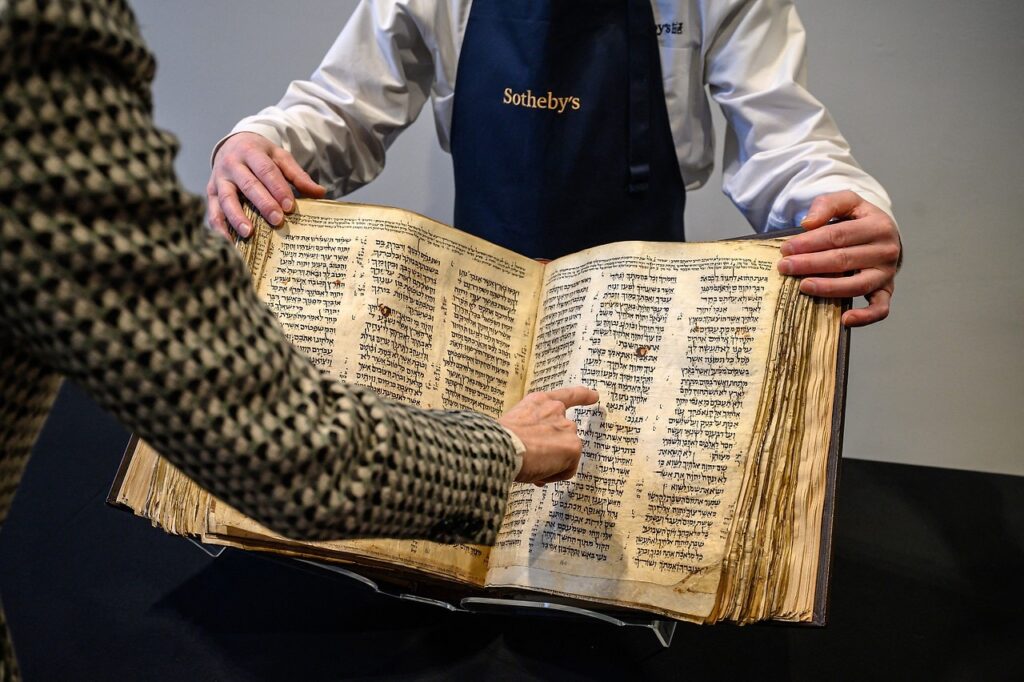 The Bible Plus Everything
The Bible Plus Everything
by Thomas Lee Abshier, ND
4/3/2025
The Family has a slogan, “Jesus Plus Nothing.” Jeff Sharlet wrote a book about The Family, which condemns the organization for being a network of influence that allows the church to influence the state. The slogan, “Jesus plus Nothing,” allows people to unite in the political-economic sphere to make alliances between the rich and powerful. The problem is that the vagueness of this stand does not allow for any accountability. The actual stand of The Family is unknown, as simply standing for “Jesus” is not specific enough to determine compliance. There is benefit and power associated with merely invoking the name of Jesus, which can produce miraculous changes.
The problem with The Family’s slogan is that it does not deeply seek holiness by pursuing an identifiable standard. The “Jesus plus nothing” slogan does not allow accountability to a performance standard. For this reason, I adopted the “The Bible plus Everything” slogan for Renaissance Ministries outreach.
The Bible plus Everything implies that the Bible applies to all aspects of life. The standard of holiness must be applied to every aspect of life.
The question raised by the book by Jeff Sharlet is what principles, doctrine, and approach should be applied to the appropriate application of the Bible to life. Many influential pastors, preachers, and evangelists have left their mark on Christendom, and the philosophy/doctrine of the church has been bent in many ways. The diversity of denominations and variation in the interpretation of scripture over the millennia is a testament to the difficulty in applying the Bible as a book of dogma that should be enforced.
Nevertheless, simply ignoring the specifics of the Bible will ensure that the blessing of complying with God’s will and way is missed. Thus, I advocate unabashedly supporting the reading, debating, and understanding of the Bible as best as possible. The model that is probably best adopted is one of local governance, state governance, and national governance, each having more specific legislation in the secular/behavioral/public morality sphere. Each of the States of the United States are sovereign in that they have a constitution and laws, limited only by the few restrictions reserved for national governance. Thus, each state is a laboratory of democracy, as was intended by the Founders. In this laboratory, each State attempts to guide their citizenry in a society-wide expression of holiness according to their best interpretation of the letter and spirit of the Bible, the Constitution, the Bill of Rights, and the Declaration of Independence.
The slogan of Renaissance Ministries, “The Bible plus Everything,” implies that the Bible should be applied to everything in life: private life, relationships, worship, health, finances, sexuality, work, and governance. The Bible is a revelation of God’s will and way for men, as a guide to how men can please Him. Given that mankind has been given free will, we, as humans, can choose to do anything, and without a standard of action, we may choose to displease Him. No domain of life is untouched or unseen by God. God is either pleased or displeased by our choice of action.
An interpretation of the Bible should not be coerced. But if the state adopts a moral code based upon an interpretation of the Bible’s revelation of God’s way, then, in effect, a Biblical interpretation has been defined and the purpose of the state is to enforce its laws. Thus, in the United States of America, with the 50 States each having their independent domains of authority to establish and enforce moral codes, citizens can lobby, educate, rally, and promote any point of view regarding proper Biblical interpretation and subsequent legislation. Freedom of travel and moving residence to a jurisdiction more compatible/congruent with a person’s interpretation of the Bible, as converted into legislation, is the state law.
Is the above a correct stand to take by Renaissance Ministries, to include the Bible in the deliberation of State and National law? What should Renaissance Ministries’ stand/doctrine/creed be? What is the appropriate moral center of legislative righteousness that should be taught/advocated?
On that note, George Washington advocated for the nation to base its moral principles and legislation on “the general principles of Christianity.” There are sufficiently clear, non-controversial, Biblically declared stands about the general principles of public behavior, and there is little ambiguity about the moral stands on issues that should be advocated and legislated.
The specifics of the application of the Bible to legislation will probably continue to be a point/arena of debate for the duration of man’s time on earth. And the topics of much of the discussion on the Renaissance-Ministries.com website will examine these issues. Still, the general principle should be that the legislative deliberation of the States should allow their laws and allowing the Bible to be included as a standard of moral comparison. This is because the First Amendment does not prohibit such inclusion. The FIrst Amendment prohibits “Congress enacting laws that establish a religion.” The consideration of the Bible’s words, concepts, morality does not constitute the establishment of a religion.
AI Summary of The Family:
The Netflix documentary series “The Family” is based on the book “The Family: The Secret Fundamentalism at the Heart of American Power” by investigative journalist Jeff Sharlet. The book, published in 2008, delves into the world of a secretive Christian organization known as The Fellowship (also sometimes referred to as “The Family”). The documentary, released on Netflix in 2019, dramatizes and explores the book’s themes, focusing on the group’s influence on U.S. politics and global power structures.
Overview of the Book: “The Family” by Jeff Sharlet
What is “The Family”?
- The Family (or The Fellowship) is a highly secretive, Christian fundamentalist organization founded in 1935 by Abraham Vereide. The group’s original purpose was to unite powerful men—politicians, businessmen, and military leaders—under the banner of Christ to advance a conservative Christian agenda.
- Over time, the group shifted its focus to cultivating relationships with influential leaders in the U.S. and abroad, prioritizing power and influence over public visibility.
Central Themes of the Book
- Secrecy and Power:
- The Family operates behind the scenes, avoiding public scrutiny while quietly shaping U.S. domestic and foreign policies by networking with powerful individuals.
- The group’s private, invitation-only gatherings and its emphasis on secrecy have made it a shadowy and controversial organization.
- Christian Nationalism:
- The Family promotes a specific interpretation of Christianity that emphasizes submission to authority and the belief that powerful individuals are “chosen by God” to lead.
- This belief has been used to justify supporting authoritarian leaders and advancing conservative policies.
- Influence on U.S. Politics:
- The Family has cultivated relationships with numerous U.S. politicians from both major parties, though it leans heavily toward conservative and Republican leaders.
- Its most visible project is the National Prayer Breakfast, an annual event attended by U.S. presidents, members of Congress, and foreign dignitaries. While it appears nonpartisan, the event is organized by The Family and serves as a networking hub for its agenda.
- Global Reach:
- The Family extends its influence internationally, supporting leaders in other countries whom it views as aligned with its Christian ideals, even if they are authoritarian or controversial.
- Critique of Fundamentalism:
- Sharlet critiques the group’s fundamentalist theology, which he argues prioritizes power and control over compassion or democratic values. The Family’s belief in “Jesus plus nothing” is portrayed as a way to strip Christianity of its broader ethical and moral dimensions.
The Netflix Documentary: “The Family”
Overview
- The Netflix series “The Family” is a five-part documentary released in 2019. It adapts Jeff Sharlet’s book and combines interviews, archival footage, and dramatizations to expose the inner workings of The Family.
Key Focus Areas
- The National Prayer Breakfast:
- The documentary highlights how The Family uses the National Prayer Breakfast as a platform to influence U.S. and international leaders under the guise of faith and unity.
- Recruitment and Grooming:
- The series shows how The Family recruits young men (often through college groups) to groom them for leadership roles. These recruits are taught to value loyalty to the group and its mission above all else.
- Global Impact:
- The Family’s involvement in supporting international leaders, some with questionable human rights records, is explored in depth.
- Secrecy and Accountability:
- The documentary critiques the lack of transparency surrounding The Family’s activities and its ability to operate without significant public or governmental oversight.
Dramatizations:
- The series uses dramatizations of Jeff Sharlet’s personal experiences while he lived at Ivanwald, a Fellowship-owned house in Arlington, Virginia, where young men were trained in the group’s ideology.
Key Takeaways from the Book and Documentary
- Invisible Power:
- The Family wields significant power in U.S. politics and international relations, yet it operates largely behind the scenes, avoiding public attention and accountability.
- Religious Justification for Power:
- The group’s theology frames powerful individuals as divinely chosen leaders, which can lead to the justification of unethical behavior or policies.
- Criticism of Fundamentalism:
- Both the book and the documentary critique the dangers of mixing religion with unchecked political power, warning of the erosion of democratic principles and human rights.
- Blurring of Church and State:
- The Family’s activities raise concerns about the separation of church and state, as it seeks to influence government policies and leaders through religious networks.
Controversy and Criticism
- Lack of Transparency:
- The Family’s secretive nature has led to criticism that it operates as a “shadow government,” prioritizing its own agenda over democratic accountability.
- Support for Authoritarian Leaders:
- The Family has been accused of aligning itself with authoritarian figures and controversial regimes under the pretense of spreading Christian values.
- Religious Exclusivity:
- Critics argue that The Family’s narrow interpretation of Christianity is exclusionary and dismisses other faiths and worldviews.
- Response from The Family:
- Members of The Family have largely avoided public comment, maintaining their tradition of secrecy. Some have argued that their mission is simply to bring people of faith together, not to wield political power.
Why Is This Important?
The book and documentary reveal how religious fundamentalism can intersect with political and economic power to influence societies in ways that are often hidden from public view. It raises critical questions about:
- The role of religion in politics.
- The ethics of secrecy in organizations that influence public policy.
- The balance between faith-based initiatives and democratic governance.
Conclusion
Jeff Sharlet’s book “The Family” and its Netflix adaptation expose the secretive workings of a powerful religious organization with far-reaching influence. The Family’s use of faith to justify power and its quiet manipulation of political systems make it a critical case study for understanding the intersection of religion, politics, and power. While the group portrays itself as a benign force for unity and prayer, the book and documentary suggest that its true agenda deserves closer scrutiny.
